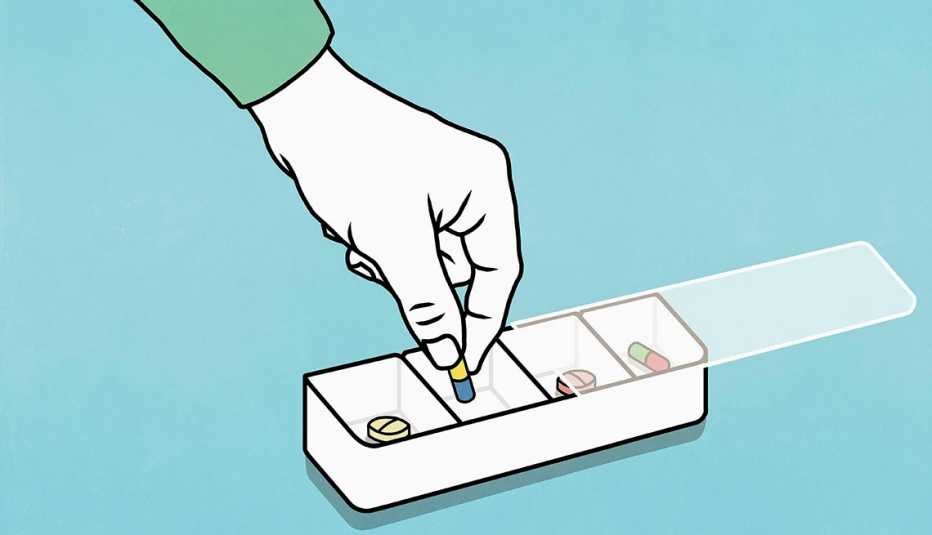AARP Hearing Center


Almost any medication can cause side effects, but some can create a surprising challenge: weight gain. This isn’t just a cosmetic concern — even small increases in weight can affect your overall health and, in some cases, interfere with recovery from the very condition you’re trying to treat.
Weight gain may not seem critical, especially when treating serious conditions, but even modest gains (5 to 20 pounds) can harm overall health, one study shows. Obesity increases the risk of diseases like heart disease, stroke, and death, according to the Centers for Disease Control and Prevention.
For patients who have other medical issues — osteoarthritis or high blood pressure, for example — “the excess weight can potentially worsen” those conditions, says, John Batsis, M.D., an associate professor of medicine in the Department of Medicine and Nutrition at the University of North Carolina at Chapel Hill.
8 medications that could cause weight gain
1. Diabetes drugs
Maintaining a healthy weight is an important part of any treatment for type 2 diabetes. But here’s the rub: Some of the drugs prescribed to help manage the condition often result in weight gain.
Diabetes drugs that may cause weight gain include:
- Injectable insulin: The hormone works by helping the body’s cells absorb glucose. Insulin causes a spike in weight, however, when the cells absorb too much glucose and the body converts it into fat. Not everyone with type 2 diabetes is on insulin. But insulin isn’t the only type 2 treatment that carries this side effect.
- Sulfonylureas (such as glyburide, glipizide and glimepiride) reduce blood sugar levels by 20 percent, but they can also can also cause a weight gain of 4 to 5 pounds on average, according to a study published in Archives of Medical Science. That’s because they stimulate beta cells in the pancreas to release insulin.
What to do: These medications have been used for many years and are often commonplace in diabetes management, but there are newer medications that promote weight loss and should be considered,” Batsis says. A class of type 2 diabetes drugs known as glucagon-like peptide 1 (GLP-1) agonists can cause patients to lose a significant amount of weight — 15 to 20 percent of their body weight. Some of the more common names in this class include semaglutide (Ozempic) and tirzepatide (Mounjaro).
Talk to your doctor if you’re concerned.
2. Antidepressants
If you’ve been on an antidepressant for a while and you’ve put on weight, it could be a sign of improved mood if weight loss was a symptom of your depression.
Significant weight gain, on the other hand, is likely a side effect of the medication itself, especially if you’re taking an SSRI (short for selective serotonin uptake inhibitor), the most commonly prescribed class of antidepressants. These medications increase "the amount of serotonin in your brain, which is a key neurotransmitter involved in depression,” Batsis says. “Serotonin, though, is also implicated in the biological and neurotransmitter processes that regulate weight and appetite. There are many serotonin receptors, but at a high level, they interfere with this process.”
Antidepressants that may cause weight include:
- Paroxetine (Paxil)
- Sertraline (Zoloft)
- Citalopram (Celexa)
What to do: With many of the newer second-generation antidepressants, there is often no weight gain; some, such as bupropion (Wellbutrin), may even result in weight loss, Batsis says, echoing the results of research published in 2018 in the journal Diabetes, Metabolic Syndrome and Obesity.
“Bupropion is less likely to cause weight gain and when coupled with naltrexone (Vivitrol) is a potential treatment for obesity,” he says. “Yet in older adults, bupropion, while safe, needs to be counterbalanced with other medical issues as it may have more central nervous system side effects.”
Work with your medical team to find the best treatment for your situation.



































































More on Health
Your Weight in Your 60s: What It Means for Your Health
Discover some truths about those extra pounds and six effective weight-loss strategies to start today.
Free Excerpt From New AARP Book 'The Whole Body Reset’
Putting on pounds no matter what you do? Learn how protein timing can stop age-related weight gain